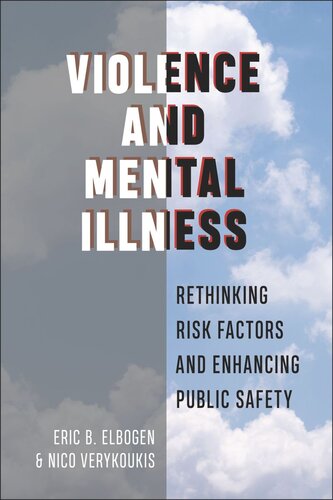

Most ebook files are in PDF format, so you can easily read them using various software such as Foxit Reader or directly on the Google Chrome browser.
Some ebook files are released by publishers in other formats such as .awz, .mobi, .epub, .fb2, etc. You may need to install specific software to read these formats on mobile/PC, such as Calibre.
Please read the tutorial at this link: https://ebookbell.com/faq
We offer FREE conversion to the popular formats you request; however, this may take some time. Therefore, right after payment, please email us, and we will try to provide the service as quickly as possible.
For some exceptional file formats or broken links (if any), please refrain from opening any disputes. Instead, email us first, and we will try to assist within a maximum of 6 hours.
EbookBell Team

5.0
60 reviewsShows that the myth that mental illness is strongly linked to violence makes us all less safe
Mass shootings have become a defining issue of our time. Whenever the latest act of newsworthy violence occurs, mental illness is inevitably cited as a preeminent cause by members of the news media and political sphere alike. Violence and Mental Illness: Rethinking Risk Factors and Enhancing Public Safety exposes how mental illness is vastly overemphasized in popular discussion of mass violence, which in turn makes us all less safe.
The recurring and intense focus on mental illness in the wake of violent tragedy is fueled by social stigma and cognitive bias, strengthening an exaggerated link between violence and mental illness. Yet as Eric B. Elbogen and Nico Verykoukis clearly and compellingly demonstrate in this book, a wide array of empirical data show that this link is much weaker than commonly believed—numerous other risk factors have been proven to be stronger predictors of violence. In particular, the authors argue that overweighting mental illness means underweighting more robust risk factors, which are external (e.g., poverty, financial strain, inadequate social support), internal (e.g., younger age, anger, substance abuse), or violence-defining (lacking empathy, gun access, hate group membership). These risk factors need to be incorporated more fully into public policies around public safety. Priority is needed to focus on strategies for reducing the viability and acceptability of violence as a choice, which regards violence- defining risk factors necessary to every violent act.
Violence and Mental Illness: Rethinking Risk Factors and Enhancing Public Safety offers a robust challenge to the inappropriate dominance of mental illness in discussions of mass violence, as well as proposed solutions that may be crucial to bringing about a greater degree of public safety.